Graham Reid | | 8 min read
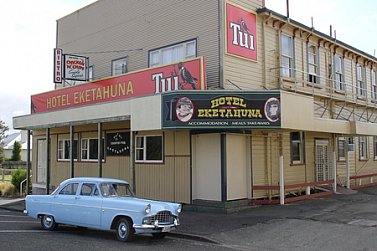
The handbrake might give you a bit of trouble, says John as he finishes a litany of idiosyncrasies about his beautifully restored 1957 Mark Two Zephyr. I have already heard it can pop out of second, to put in a measure of Valvoline with the petrol, to check the water daily, and that riding the brakes downhill might lead to them overheating and not functioning properly.
And now the handbrake doesn't work especially well?
"So you should avoid hill starts," he says as we drive through the hills of Karori.
"Sounds like we should simply avoid hills," I say. This would be funny if it weren't for where we are going.
John is generously lending my wife Megan and I his sky blue Mark Two for a drive across the Rimutaka Ranges then onto the old roads up the east coast to Napier.
Plenty of hills as we wind through farmland and vineyard country.
Wellington to Napier is usually a journey of a little over four hours up the highway but we are taking a little over four days, a leisurely trip on the back roads, through the old towns in an old car and using a 1962 edition of The New Zealand Guide.
First published over half a century ago this lovely old book informs us of the history and population of places like Herbertville on the coast near Cape Turnagain, "a small seaside resort with the best beach on the Hawkes Bay coastline south of Napier".
That deserves to be seen.
We farewell John in the mid afternoon and aim for no further than the wine country of Martinborough, a geographically confused town where the streets are named after Texas, Kansas, Suez, Naples and Venice. Ironically the square at the centre reminds us of nowhere as much as Savannah in Georgia. We have dinner at the historic Martinborough Hotel which dominates a corner of The Square, drink the local wine and watch as people stop to admire the Zephyr.
Already the car is the star and on the way here road workers were giving us toothless smiles and the thumbs up, one bellowing a loud, "Choice, mate" as we crawl past his Stop/Go sign.
The following morning we are off on our journey proper through burned green countryside peppered with flames of yellowed toe-toe and blue agapanthus outside rural homes. We are untroubled by traffic although are twice slowed by sheep and cattle, and objects on the map are smaller than they appear: Mangapakeha seems to consist of a couple of houses and a bend in the road. Our guide book informs us frequently of the "regular motor service" these small towns once had, but these days four-wheel drives and surprisingly rugged Jap imports bolt through the green landscape.
We let them pass -- although John's car could easily keep pace -- because we are in no hurry, just enjoying the sound of the cicadas, the puffs of cloud against the vivid canvas of sky, and the waves from farmers in the fields. After the winding roads we make for Eketahuna on the main road and pull in at the homely looking pub which offers hot meals and accommodation.
Having been so recently in Martinborough wine country -- and spotting steak, eggs and chips on the blackboard menu -- I ask for a glass of red wine. There's a small panic but finally the woman in the dark bar with stag heads mounted around the wall locates a cask of Chasseur which she can open for me. At $3 a glass I'm happy enough.
"This isn't wine country, this is a Tui hotel," we are assured by Pete, Mitch and George when we join them at their table. They are shearers and fencers and this is their second home. If no one is behind the bar they'll help themselves and leave the cash, or settle up later. A genuine honesty system.
George, who has lived here all his 54 years, says, "It's not like we're goin' anywhere else."
And not this night either. Mitch pulls out after a couple of hours but the rest of us sit and talk into the night. These blokes head down to Wellington tomorrow to do some work for a mate, but he doesn't drink Tui. They'll go to a bottle store on the way.
Outside the window Fonterra tankers roll by endlessly and we talk about how the small farms have become uneconomical. Nothing under a couple of hundred head of cattle makes a decent living these days, the times when a man could just run 80 head are long gone. This explains why in our New Zealand Guide so many towns have withered or, like nearby Pleckville, simply don't seem to exist anymore.
We have a hilarious night -- the meals are cheap and my steak fills the plate, and the company excellent -- and I buy the t-shirts. One reads "I've been bragging, shagging, drinking, smoking at the Eke".
At $25 each the t-shirts are more expensive than our room upstairs.
The following morning the car noses through green pastures towards Pongaroa which is pretty, picturesque and utterly deserted. It is as if everyone heard the Mark Two coming and disappeared indoors. On a hill behind the town is the equally silent cemetery, host to a hundred or so souls, where sheep graze between the headstones of pioneers like Joseph Sorrento Pim, who died aged 74 in 1952.
We sit and contemplate the beauty and silence around us. Later we drive toward Weber -- the sign announcing the hotel tells us it is "the last pub before the next one" -- then turn off toward Herbertville on the coast passing the pub which offers fresh mussel fritters.
We stop at the marker erected to commemorate Joseph and Sarah Herbert who arrived here in 1842 and gave their name to this place, and then swim in the chilly ocean at the broad, deserted beach where huge tree-trunks of driftwood are being turned white by the wind, sand and sun. It might just be "the best beach on the Hawkes Bay coastline south of Napier" and at the southern end is Burnview Station, a handsome homestead.
We wend our way back inland to Porangahau, stopping briefly to photograph the sign marking Taumatawhakatangihangakoauauotamateapokaiwhenuakitanatahu.
Then we head along the coast and back to the main highway to take in the most picturesque part of the country we have seen, the Te Aute valley with its charming old NZBC building at the roadside. That night we stay with Pete and Lynn in their homestay in coastal Waimarama (which means moonlit waters, according to our guide).
Pete is a cop and Lynn, who works in health shop in Havelock North, is a superb cook.
As the sun falls behind the hills and leaves gold traces in the sky we feast on chicken and mushrooms, fresh salads and a vegetarian bean dish. Pete is apologetic, usually before a meal they have a treat but the weather hasn't been so good so he didn't have his cray pots out near Bare Island where he goes scuba diving. Next time.
We drink local wine and listen enviously as they tell us about their small, friendly community which has weekly get-togethers. Everyone knows everyone here.
The air feels slow, the lifestyle lagging behind it even further. Houses have names like ThisleDoUs, Dunworkin and Restawhile.
We talk until midnight over coffee and port, but in the morning we are up early to swim at the deserted beach.
We come back for a leisurely breakfast and Pete takes the Zephyr for a drive, waving at impressed mates. I take his photo at the wheel. Then we pull out and head up the coast again.
At Ocean Beach I meet Bob, originally from the north east of England but now living outside Sydney at Penrith.
"Police used to drive them at home," he says as his opening gambit.
"Z Cars," I say.
"Right. You know that programme?" and we are away on a conversation. He's over for a fortnight and really should go and see a mate in Auckland, "but, you know, you get here and . . . "
He gestures down the beach where half a dozen people are scattered beneath the hot, cloud-speckled sky.
I agree. I can't think of a reason why he -- or I -- should go to Auckland either. We say our goodbyes, I look at the forbidding hill and remember John's words, but the old Zephyr takes it effortlessly and so we drive on to lunch at the impossibly beautiful Craggy Range vineyard.
In the carpark a truckie pulls up and admires the Zephyr.
"Learned to drive in one of those, mate," he says, then tells of how when he was a young fellah he was pulled over by a cop for speeding but let go because the cop also had a Mark Two. "I didn't even have a license, eh," he laughs then looks wistfully at the car.
"Those were the days."
But so are these. Driving the back roads, stopping in small pubs, chatting with farmers, counting the Tui signs and magpies . . . And all this beneath the blue canopy with the warm air in our faces.
Perversely, in Napier, the country's capital of art-deco we decide to stay in a new hotel, the Te Pania Hotel where every room has a view of the ocean. Opened only two years ago and designed by Christchurch architects Warren and Mahoney, it is white, luxurious and friendly.
We wander through the museum and admire the Don Binney retrospective in some of which his landscapes are shorthand images of what we have seen on the back roads. That night we have a superb dinner at Acqua on Marine Parade opposite the soundshell where kids are practicing fire-poi. Their laughter fills the dark, star-scattered sky.
I consider what we have experienced in just these few days. We have fallen in with hilarious company at the Eke pub, shared a leisurely breakfast with Pete and Lynn as sea-mist rolled in from the Pacific and covered the green fields of Waimarama, have wandered through fascinating museums like the one in Waipawa (the best kept secret in the district apparently), been in old rural pubs and the most sophisticated of restaurants, and seen shorelines of white sand stretch into invisibility beneath sea-spray where there is not a soul in sight.
We have driven through towns where bulging civic pride has restored old buildings of the kind Auckland developers see as a target, photographed the lovely towers of the Anglican church of St Albans at Tawera established a century ago, admired the design of Te Aute Hotel, and I have bought a 1950s Korean transistor radio in perfect nick for $32 at Bay Country Antiques in Waipawa.
We have also met extraordinary people, and not just those who have been generous and friendly. In a Tui pub a man tells me, without prompting, the country has gone to pack and started pandering to "the ho's" ("that's homosexuals," he adds helpfully), and there was the man at the Wimbledon pub where we stopped for a Tui and a pie who shook his head when he heard we were flying back to Auckland from Wellington.
"Don't fly," he said. "You never know what could happen." He was laughing, but also seemed serious.
We have breathed the thick warm air of the countryside, the crisp salt-touched breezes from the ocean, and had the odd lungful of baked possum lying dead by the roadside. We have seen hawks, magpies, ostriches, deer and hares. We have slowed for sheep and cattle.
We have, sadly, noted that the short strips of main highways we have been on have been punctuated by white crosses. We have seen very few on the old roads. But we have seen dozens of Tui beer signs on hotels and billboards, and have even passed the brewery. We have been through places where towns once thrived when our guide was written but no longer exist. We have passed signs of the kind I never thought I'd see ("piglets ready now $60") and everywhere, from coastline to valley, seen so much beauty.
I have been changed by this rare experience so I warn Megan.
"I think I'll become a Tui drinker."


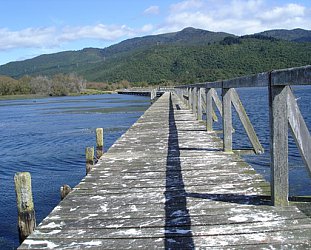
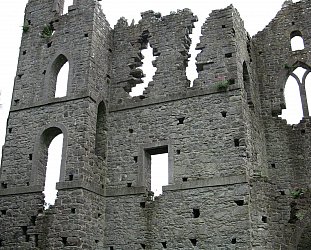
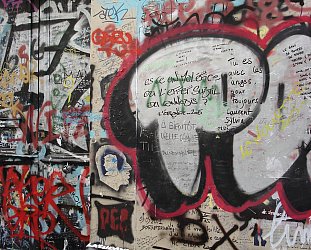
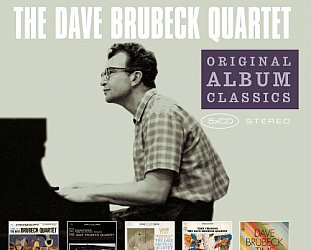
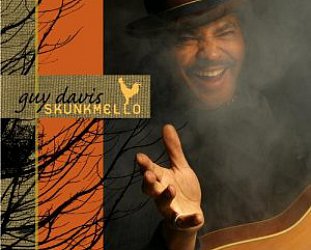
post a comment